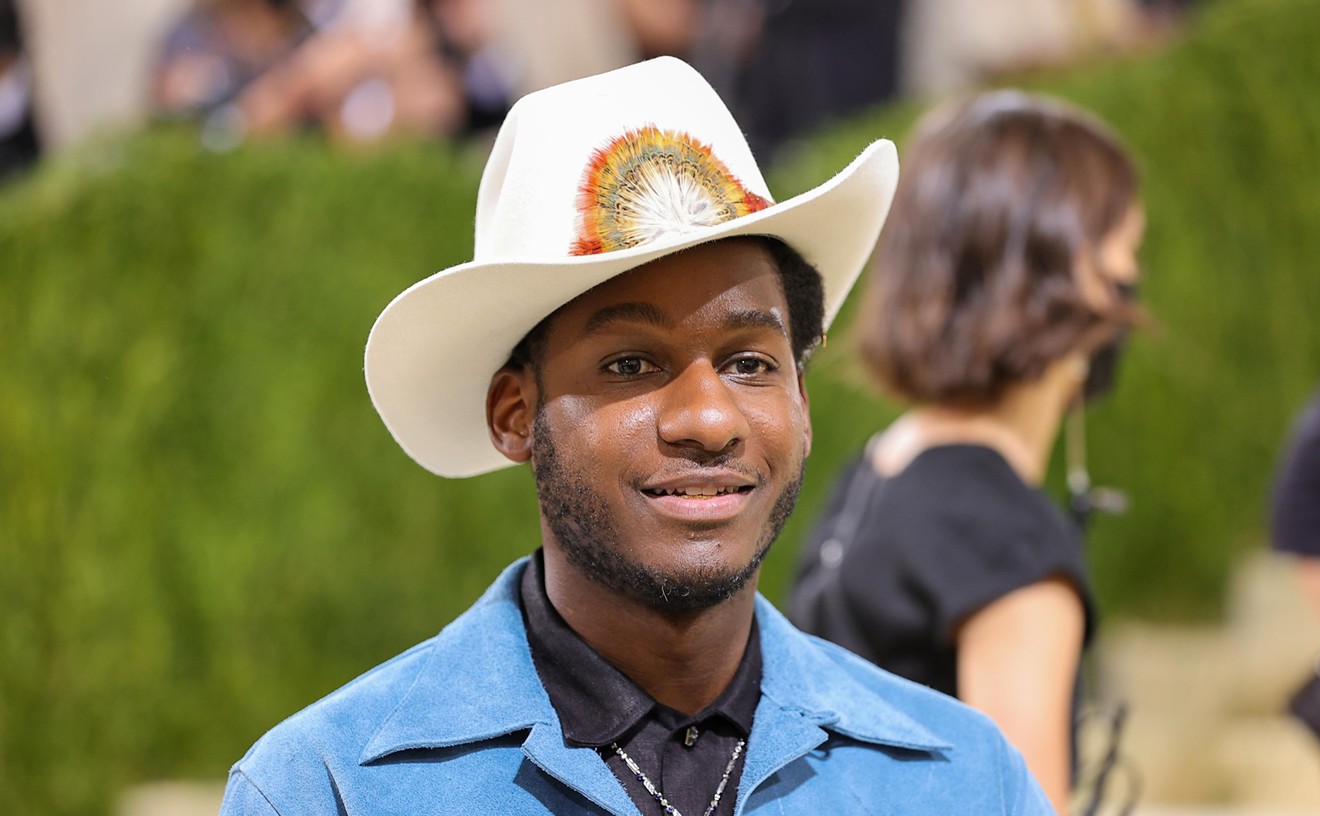Few shows are so overdone as this one. Critics dread reviewing it again and again. Ardent theatergoers greet its title on a new season brochure with groans of disappointment. Thinking Hello, Dolly! maybe? How about Tuesdays With Morrie?
Either or both. They're always playing somewhere, these two. And like theatrical crabgrass, here they come again. Dolly just opened at Lyric Stage in Irving. Morrie's in the studio space at Addison's WaterTower Theatre. But here's the deal: One's pretty darned good, delivering a warm, funny, life-affirming lesson in the value of putting love and compassion before money and ambition. The other is a stifling bore full of cheap sentiment and shallow cracker-barrel homilies passing for genuine wisdom. The surprise is which is which.
Let's start with the loud lady from Yonkers. Dolly Gallagher Levi began her dogged pursuit of "famous half-a-millionaire" Horace Vandergelder in Thornton Wilder's 1938 comedy The Merchant of Yonkers, based in part on a 19th-century Austrian play, later re-written and re-titled The Matchmaker. She earned the Hello, a comma, the exclamation mark and nine Tony Awards for the 1964 Broadway musical version featuring a book by Michael Stewart, and hit-spawning music and lyrics by Jerry Herman. Dolly would never go away again thanks to the Oscar-winning 1969 film and several subsequent Broadway revivals.
With the same corny appeal of Guys and Dolls and The Sound of Music, ditzy Dolly has become a dependable warhorse of a show. It's a perennial favorite of high schools, where teenagers in shiny orthodonture masquerade as middle-aged Dollys and Horaces. Smaller regional or community theaters skimp on sets and orchestra so they can pay some brassy, past-her-prime pro (paging Ruta Lee!) to don a bustle and waddle around in the lead.
It's rare to see a Dolly done full out anymore, with age-appropriate actors in all the roles and a bunch of good musicians in the pit. But Lyric, the little company in Irving devoted to reviving rarely done American musicals, has gone for it. This show hardly fits that "rarely done" requirement, but good golly, this Dolly is so good, it feels freshly spiffed up. There's life in the old girl yet.
Lyric puts special emphasis on proper singing—too many other theaters doing musicals seem to suffer from chronic tin ear syndrome—so the cast of Dolly is packed with major vocal vavoom. In the title role, the formidable Julie Johnson pitches her singing nicely between the big belting of Ethel Merman and the precisely enunciated cooing of Angela Lansbury. (Johnson plays her more Southern belle than New York yenta, so it helps to remember that Dolly's maiden name is Gallagher.) As Dolly's love interest, Bradley Campbell is a hefty Horace with a clear, muscular baritone, perfect complements to Johnson's roundish tones and plump silhouette.
Director Cheryl Denson, who also staged Lyric's phenomenal Carousel last fall, has cast great singers who happen to be capable actors with real comic chops. That helps to make this truly a musical comedy. Johnson and Campbell twinkle with mischief in the romantic tug-of-war scenes between obstinate merchant Horace and widowed marriage broker Dolly. Their dinner date at the Harmonia Gardens, with Dolly leading Horace through tricky verbal switchbacks on the way to a proposal, is feisty and funny.
The story sets up a series of farcical coincidences involving Dolly, who's pretending to find a wife for Horace, and Horace's two bachelor clerks, Cornelius (played by Lyric founder and producer Steven Jones) and Barnaby (Michael Mandrikian). On a day off from work in 1890s Manhattan, the naïve boys stumble into the hat shop owned by Irene Malloy (Catherine Carpenter Cox), a young widow unhappily headed toward marriage to Horace. At first sight, Irene and her assistant Minnie (Arianna Movassagh) fall for Cornelius and Barnaby and set out for a day of sightseeing, then dinner and dancing at the same elegant restaurant where Dolly schemes to nab Horace for herself.
Along the way, money-grubbing Horace learns to be a little more generous with his dollars and his affections, and his perpetually poor and single clerks take their chances on love and end up the better for it. In trying to find happiness the second time around, the matchmaker has to let go of her lingering loyalty to dead husband Ephraim so she can feel free to pursue her new man. The familiar title number, signaling her entrance down the staircase into the restaurant, also serves to reintroduce Dolly Levi to Horace as a single woman, not merely as his meddlesome marriage consultant.
Lyric's Dolly builds momentum from first song to last, moving in a dizzy, dreamlike spin. Jerry Herman's lyrics for the first-act song "Dancing" say it perfectly: Make the music weave a spell/Whirl away your worry/Things look almost twice as well/When you're slightly blurry. When pretty chorus girls twirl on in their feathered picture hats and frilly pastel frocks (by costumer Billie Boston), the stage blurs into a parade of color and motion. And not letting that parade pass her by for one second, Johnson's Dolly Levi marches to the edge of the stage, tilts up her chin and lets loose with the booming anthems.
Such fun is this show that a few minor imperfections, such as some clunky dancing by a few men in the ensemble, are hardly worth mentioning. On a stage that looks like a red velvet jewel box, singing big and letting the audience bask in her glow, Dolly looks like she's right where she belongs.
The title on the program says Tuesdays With Morrie, but the actual name of the two-man play is Mitch Albom's Tuesdays With Morrie. Notice who gives himself top billing.
Based on the book that was based on interviews inspired by episodes of Nightline, and which then became an Oprah favorite, an Emmy-winning TV tearjerker and finally the play, Tuesdays With Morrie wants you to believe it's a true account of the last brave days of Professor Morrie Schwartz. Fighting the degenerative effects of Lou Gehrig's Disease, Schwartz, a Brandeis University sociology teacher, sat with his former student, sportswriter Albom, for a series of Tuesday afternoon conversations at Albom's request. Albom taped the meetings and turned Schwartz's words of wisdom about living and dying into a slim book that shot to the top of the best-seller lists and has so far sold more than 11 million copies.
There's something disquieting about the theatrical adaptation (co-written by Albom and playwright Jeffrey Hatcher) that's currently playing at Addison's WaterTower Theatre. The emphasis shifts the focus from Schwartz, played by Gary Taggart (who also did the role at Fort Worth's Circle Theatre), to Albom, played by Joe Nemmers. The Albom character gets the most lines as he narrates his own story, addressing the audience directly as he recounts his relationship with Schwartz. Promising to keep in touch after graduating from Brandeis in the 1970s, Albom instead has ignored Schwartz for 16 years. Then Albom sees him on TV with Koppel and decides to make weekly visits, flying from Detroit, where he has high-profile gigs at a newspaper and on TV and radio, to the prof's home in the Boston area.
Is he reaching out in sympathy to an old mentor, or does the play's Albom smell surefire book contract? The way it's played onstage, Albom doesn't come off as a nice guy with altruistic motives. Even in his visits to the ailing Schwartz, he's impatient, taking calls from demanding editors and complaining that he has to miss an interview with a hotshot ballplayer because of the Tuesday get-togethers.
Schwartz, meanwhile, is choking on his egg salad and being ignored by nurses as he gasps for breath. Somehow he recovers enough in each scene of the 90-minute one-act to utter vacant aphorisms such as "Once you learn how to die, you learn how to live." But the lessons he's trying to teach his former student about priorities don't seem to sink in.
Tuesdays With Morrie reveals Albom as an egotistic fame-seeker with unbridled ambition. The play's Mitch Albom keeps reminding the audience and Schwartz of all the things he's given up to get ahead. He quit playing jazz piano so he could earn a master's in journalism at Columbia. He sacrificed a personal life to be a highly paid sports columnist. And all those flights on all those Tuesdays—man, what a pain. Hey, Mitch, see the old man in the chair? He's lost the ability to swallow. Now complain.
That's the strange thing about this play. The life being celebrated is the wrong life. It's Albom, justifying how he whored out a dying man to sell millions of books.
At one point toward the end, Schwartz asks Albom why he kept showing up every Tuesday. "I come here one day a week to make up for the jerk I am the other six," says Albom. Now that sounds like the truth.
Hello, Dolly!
Tuesdays With Morrie










